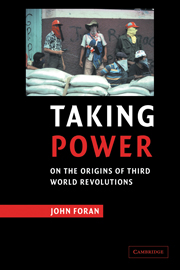1 - Theorizing revolutions
Published online by Cambridge University Press: 22 September 2009
Summary
… there are real difficulties in grouping revolutions or, for that matter, any major historical phenomena.
Barrington Moore, Jr.… successful revolutions always have been, and always will be, unique.
Alberto Flores GalindoRevolutions powerfully shaped the twentieth-century world we have left, and promise to continue to do so on into the new millennium. The revolutionary events of the past generation in both the Third World from Iran and Nicaragua in 1979 to China and Eastern Europe in 1989 and Chiapas today, pose again old puzzles for social theory even as they herald the new situation of a post-cold war world. Alexis de Tocqueville's dual observation on the French revolution rings just as true for any of these more contemporary upheavals: “never was any such event, stemming from factors far back in the past, so inevitable yet so completely unforeseen.” Virtually all of these social movements took analysts by surprise, and send us back to our theories to detect those distant factors that, in some sense, caused them.
The present study aims to shed new light on a set of transformational struggles that may be clustered under the rubric of “Third World revolutions.”
- Type
- Chapter
- Information
- Taking PowerOn the Origins of Third World Revolutions, pp. 5 - 30Publisher: Cambridge University PressPrint publication year: 2005

